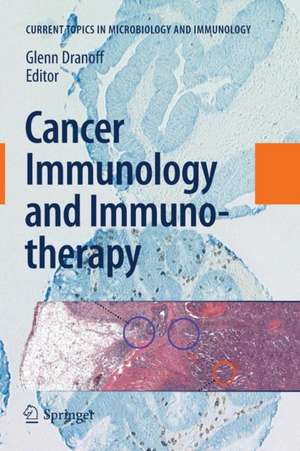Cancer Immunology and Immunotherapy: Current Topics in Microbiology and Immunology, cartea 344
Editat de Glenn Dranoffen Limba Engleză Paperback – 29 mai 2013
| Toate formatele și edițiile | Preț | Express |
|---|---|---|
| Paperback (1) | 1411.17 lei 6-8 săpt. | |
| Springer Berlin, Heidelberg – 29 mai 2013 | 1411.17 lei 6-8 săpt. | |
| Hardback (1) | 1415.75 lei 6-8 săpt. | |
| Springer Berlin, Heidelberg – 15 apr 2011 | 1415.75 lei 6-8 săpt. |
Din seria Current Topics in Microbiology and Immunology
- 18%
 Preț: 962.03 lei
Preț: 962.03 lei - 5%
 Preț: 1123.13 lei
Preț: 1123.13 lei -
 Preț: 499.76 lei
Preț: 499.76 lei - 5%
 Preț: 967.79 lei
Preț: 967.79 lei - 18%
 Preț: 1118.62 lei
Preț: 1118.62 lei - 5%
 Preț: 717.00 lei
Preț: 717.00 lei - 5%
 Preț: 712.97 lei
Preț: 712.97 lei - 5%
 Preț: 709.51 lei
Preț: 709.51 lei - 5%
 Preț: 709.51 lei
Preț: 709.51 lei - 5%
 Preț: 721.19 lei
Preț: 721.19 lei - 5%
 Preț: 359.78 lei
Preț: 359.78 lei - 5%
 Preț: 711.88 lei
Preț: 711.88 lei - 5%
 Preț: 774.81 lei
Preț: 774.81 lei - 15%
 Preț: 640.06 lei
Preț: 640.06 lei - 5%
 Preț: 717.00 lei
Preț: 717.00 lei - 5%
 Preț: 360.34 lei
Preț: 360.34 lei - 5%
 Preț: 707.69 lei
Preț: 707.69 lei - 5%
 Preț: 717.56 lei
Preț: 717.56 lei - 5%
 Preț: 716.28 lei
Preț: 716.28 lei - 5%
 Preț: 717.20 lei
Preț: 717.20 lei - 5%
 Preț: 711.32 lei
Preț: 711.32 lei - 5%
 Preț: 711.88 lei
Preț: 711.88 lei - 5%
 Preț: 718.29 lei
Preț: 718.29 lei - 5%
 Preț: 709.51 lei
Preț: 709.51 lei - 5%
 Preț: 369.84 lei
Preț: 369.84 lei - 5%
 Preț: 712.25 lei
Preț: 712.25 lei - 5%
 Preț: 716.45 lei
Preț: 716.45 lei - 5%
 Preț: 706.60 lei
Preț: 706.60 lei - 5%
 Preț: 711.52 lei
Preț: 711.52 lei - 5%
 Preț: 713.54 lei
Preț: 713.54 lei - 5%
 Preț: 720.47 lei
Preț: 720.47 lei - 5%
 Preț: 725.42 lei
Preț: 725.42 lei - 5%
 Preț: 708.06 lei
Preț: 708.06 lei - 5%
 Preț: 713.70 lei
Preț: 713.70 lei - 5%
 Preț: 705.83 lei
Preț: 705.83 lei - 5%
 Preț: 710.96 lei
Preț: 710.96 lei - 5%
 Preț: 723.93 lei
Preț: 723.93 lei - 5%
 Preț: 707.69 lei
Preț: 707.69 lei - 5%
 Preț: 715.35 lei
Preț: 715.35 lei - 5%
 Preț: 709.87 lei
Preț: 709.87 lei - 5%
 Preț: 359.05 lei
Preț: 359.05 lei - 5%
 Preț: 374.20 lei
Preț: 374.20 lei - 15%
 Preț: 635.31 lei
Preț: 635.31 lei - 5%
 Preț: 707.86 lei
Preț: 707.86 lei - 5%
 Preț: 721.96 lei
Preț: 721.96 lei - 15%
 Preț: 632.88 lei
Preț: 632.88 lei - 15%
 Preț: 632.05 lei
Preț: 632.05 lei - 15%
 Preț: 642.83 lei
Preț: 642.83 lei - 5%
 Preț: 709.14 lei
Preț: 709.14 lei
Preț: 1411.17 lei
Preț vechi: 1485.45 lei
-5% Nou
270.04€ • 279.01$ • 224.64£
Carte tipărită la comandă
Livrare economică 19 martie-02 aprilie
Specificații
ISBN-10: 3642267882
Pagini: 320
Ilustrații: XIV, 306 p.
Dimensiuni: 155 x 235 x 17 mm
Greutate: 0.45 kg
Ediția:2011
Editura: Springer Berlin, Heidelberg
Colecția Springer
Seria Current Topics in Microbiology and Immunology
Locul publicării:Berlin, Heidelberg, Germany
Public țintă
ResearchRecenzii
“This book comprises 13 reviews, contributed by members of a cross-section of groups working in the … field of cancer immunology. … this book is at its best when considering small and apparently discrete topics – its strength comes from being able to read all of these ideas on one place. … Overall, this book gives a thorough and detailed overview of the current state of basic and translational research into cancer immunology … . It’s probably most appropriate for researchers … .” (Victoria Lawson, Immunology News, November, 2011)
Textul de pe ultima copertă
Caracteristici
Cuprins
Immune infiltration in human cancer: prognostic significance and disease control.- Subversion and coercion - The art of redirecting tumor immune surveillance.- STAT3: A target to enhance antitumor immune response.- Biology and clinical observations of regulatory T cells in cancer immunology.- Dendritic cell subsets as vectors and targets for improved cancer therapy.- Identification of human idiotype-specific T cells in lymphoma and myeloma.- Modulation of CTLA-4 and GITR for cancer immunotherapy.- Immunologically active biomaterials for cancer therapy.- Subject index
Descriere
The interplay between tumors and their immunologic microenvironment is complex, difficult to decipher, but its understanding is of seminal importance for the development of novel prognostic markers and therapeutic strategies. The present review discusses tumor-immune interactions in several human cancers that illustrate various aspects of this complexity and proposes an integrated scheme of the impact of local immune reactions on clinical outcome. Current active immunotherapy trials have shown durable tumor regressions in a fraction of patients. However, clinical efficacy of current vaccines is limited, possibly because tumors skew the immune system by means of myeloid-derived suppressor cells, inflammatory type 2 T cells and regulatory T cells (Tregs), all of which prevent the generation of effector cells. To improve the clinical efficacy of cancer vaccines in patients with metastatic disease, we need to design novel and improved strategies that can boost adaptive immunity to cancer, help overcome Tregs and allow the breakdown of the immunosuppressive tumor microenvironment.







